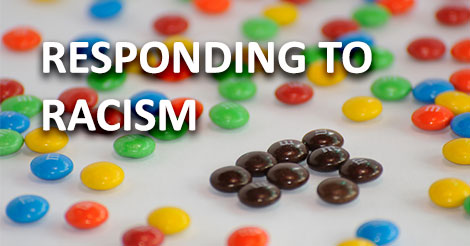In today’s The Conversation (a platform for academics to share research on issues of public interest) psychologists Emma Thomas and Anne Pedersen, discuss how should we, as bystanders, respond to racist behaviour. (Both Thomas and Pedersen teach psychology at the Murdoch University). Their article uses the context of the booing of Adam Goodes to discuss why responding to racist behaviour is important, what message it gives out, and what are the different ways to confront.
It is important to understand that confronting and challenging racism head-on is not the only response, in fact on some occasions it is not advisable. There are a range of responses we can use to show our disapproval of racist behaviour.
Here’s what Thomas and Pedersen suggest we should consider:
– Be mindful of personal safety.
– If you can’t confront, you can offer support to the victim
– Implicity or explicitly challenge the perpetrator’s views (if you think you are safe)
– Record the encounter
– Report to authorities.
From an online perspective, we would translate these recommendations as:
- Personal Safety: Don’t participate in discussions on pages which are aggressively racist, or have an aggressive following. You can become a victim of cyberbullying and harassment yourself. When reporting content on Facebook, the platform encourages you to contact the person who uploaded the content: we highly recommend not to do that. Facebook will make all your personal details available to the admins of such pages, while you will no knowledge of who they are. It has led to serious instances of cyberbullying of people who protest hateful content. Here are some other ways to stay safe online.
- Offer support to victims: In an online environment, it translates as building support pages and online campaigns for the victim or against a specific kind of hate. For example, people have created pages supporting Adam Goodes, different communities facing racism, and/or pages that stand against hate, such as our own. You can join these pages, share their material, engage in their conversations.
- Implicitly or explicitly challenge the perpetrator’s views: We recommend this path, when you find friends and acquaintances posting racist/hateful content. You can also challenge such views on social media platforms that you know are well moderated.
- Record the encounter: You can take screenshots of such conversations.
- Report it to authorities: We highly recommend reporting the content to the platform and then reporting it to OHPI’s online hate reporting tool FightAgainstHate.com. Our tool will save the hyperlink for you to access it whenever you need. It will also monitor how long was it online before it was removed. We share this data with government agencies, other NGOs and academics who are working in the field. If you feel personally threatened, take the issue to the police.
OHPI is an Australian charity dedicated to fighting online hate, including online racism, antisemitism, anti-Mulim hate, hate against Indigenous Australians, misogyny, cyberbullying, serious trolling and more. You can visit our website here, follow us on Facebook and Twitter and join our mailing list.
You can access all our publications on online racism here and on hate against Indigenous Australians, in specific, here.
You can share this article here:

